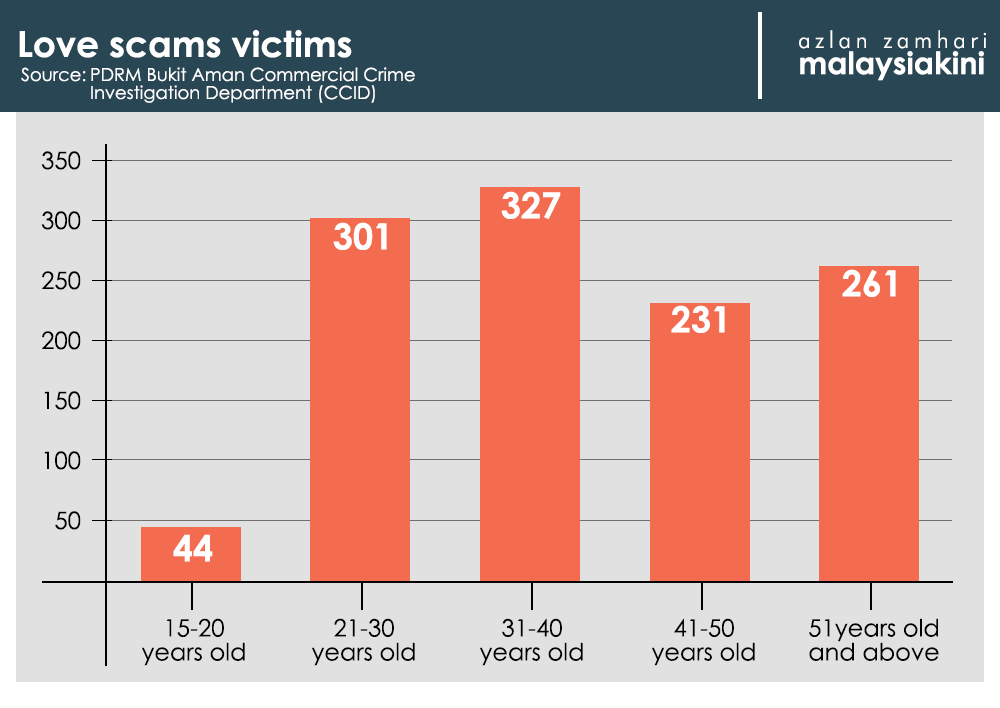
A total of 1,164 individuals have fallen victim to love scams from January to September this year, more than half involving those from the age between 15 and 40.
The accumulated loss within the period was RM62.97 million, according to statistics obtained from the Bukit Aman Commercial Crime Investigation Department (CCID).
Statistics showed that the highest number of victims belonged to those in the age bracket of 31-40 which recorded 327 victims, followed by those in 21-30 bracket (301), 51 and above (261), 41-50 (231), and 15-20 (44).
The biggest case involved a 51-year-old woman who was duped into wiring RM3.26 million to a scammer.
CCID chief Mohd Zakaria Ahmad (above) said in most of the cases, victims failed to reclaim the money which they had willingly transferred via bank account when they were smitten with "ghosts".
"Most victims couldn't get their money back because they only had the courage to file a police report long after they realised that they were cheated by fraudsters.
"By then, the perpetrators had disappeared," Zakaria told Malaysiakini.
"Our investigations showed that these gullible victims, many comprised of young women and men, were obsessed with looks and the nationality background of those 'online partners' they fell in love with.
"They were quick to invest in a relationship and became attentive lovers for their partners who actually did not exist.
"They were in a relationship with ghosts," he added.
When reports were lodged, police faced an uphill task of tracking down the suspects, which led to 471 out of the 1,164 investigation papers completed and the suspects charged in court within the period, said Zakaria.
He stressed that the love scam syndicates have their reasons to operate in Malaysia, even scamming people in Indonesia, Brunei, and Taiwan, all from the comfort of their dens in this country.
This year, police have opened 25 investigation papers involving victims from those countries.
"It is easy to obtain a student visa here as many education institutions allow prospects to further study without meeting the courses' requirements.
"They did not monitor their foreign students. Although they had no full class attendance, they were allowed to extend their student passes," Zakaria said.
On top of that, the former Pahang police chief said the scammers used mobile numbers which they easily registered using fake identities.
"They were able to do so because mobile operators did not tighten the registration process," he added.
Difficult to track down suspects
Another challenge is that the Internet Service Provider could not provide accurate locations based on the suspect's Internet Protocol address, making it difficult for investigating officers to track down the suspect.
While the number seems huge, police said there was a decline compared to the previous year.
"From January to September last year, 1,387 investigation papers were opened, and the losses involved RM79.72 million," Zakaria said.
He added that the modus operandi in love scams has been the same over the years, but there are people who still fall into the trap.
"Both victim and suspect meet on social media. The suspect, using fake picture and identity, uses his charm to make the victim fall in love and to earn his or her trust.
"Then, the suspect persuades the victim to transfer a certain amount of money for various reasons.
"The victim will be contacted by the suspect's accomplice who disguises as an officer with a certain authority and asks the victim to transfer money into a bank account (belonging to a mule).
"Once the funds successfully transferred, and sometimes after several transfers, the suspect couldn't be contacted," he said. - Mkini




No comments:
Post a Comment
Note: Only a member of this blog may post a comment.